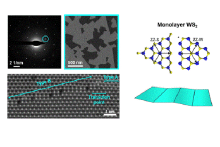Energy, environmental seed grants awarded to 21 interdisciplinary teams
Furthering its mission to support diversity, equity and inclusion (DEI), the College of Earth and Mineral Sciences (EMS) has provided funding for each of its five departments to appoint faculty to serve as DEI associate heads.
Registration is now open for Penn State’s annual Materials Day, to be held Oct. 12-13 as a hybrid event both virtually and on the University Park campus.
A national research center that brings together university, industry and government partners to develop atom-thin 2D coatings with wide-ranging industrial applications is expanding thanks to a grant from the National Science Foundation (NSF).
Travis Peters, a doctoral candidate in materials science and engineering at Penn State, will spend a year researching wearable electronics for medical use at Oak Ridge National Laboratory as part of an elite program funded by the U.S. Department of Energy (DOE).
Jenni L. Evans, director of Penn State’s Institute for Computational and Data Sciences, professor of meteorology and atmospheric science, and faculty associate of the Earth and Environmental Systems Institute, has been recognized as a university fellow by Monash University in Melbourne, Australia.
Penn State’s Radiation Science & Engineering Center (RSEC), home to the Breazeale Reactor — the nation’s first licensed and longest continuously operating nuclear research reactor, is expanding to accommodate an equipment donation valued at $9.8 million and to facilitate more advanced neutron beam research as well as the growth of nuclear engineering at Penn State.
In nature, the interaction of molecules at the boundary of different liquids can give rise to new structures. These self-assembling molecules make cell formation possible and are instrumental to the development of all life on Earth.
A novel method of characterizing the structural and chemical evolution of silicon and a thin layer that governs battery stability may help resolve issues that prevent using silicon for high-capacity batteries, according to a group of researchers.










